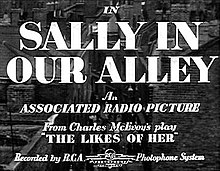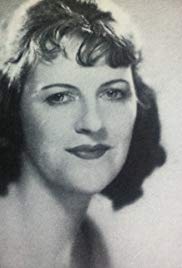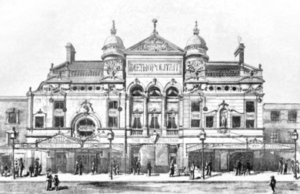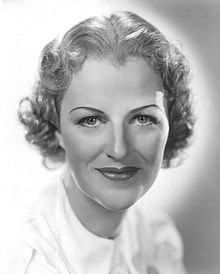Sally in Our Alley **** (1931, Gracie Fields, Ian Hunter, Florence Desmond) – Classic Movie Review 8,431
The 1931 British romantic comedy drama film Sally in Our Alley is the first film of music hall star Gracie Fields, establishing her as a major UK film star.
Director Maurice Elvey’s 1931 British romantic comedy drama film Sally in Our Alley is the first film of music hall star ‘Our Gracie’ Fields (already aged 33) and it took £100,000 at the box office, establishing her as a major UK film star. The film put the Lancashire lass firmly on the movie map throughout the Thirties, thanks to her warm and winning personality and her endless cheeriness and vitality.
Here she brings these in bucketloads as Sally Winch, a singing waitress at a society ball whose reunion with her World War One war-wounded British soldier lover George Miles (Ian Hunter) is blocked by a jealous, lying girl, Florrie Small (Florence Desmond).
Perhaps the primitive sound-film technique holds it back a little, but Sally in Our Alley is still a very happy and entertaining musical comedy. The title song of ‘Sally’ (music by Harry Leon and lyrics by Leo Towers, with Will E Haines) is Gracie’s hugely popular evergreen hit and theme song; she was still singing it 40 years later in her comebacks on stage and TV. The film’s title refers to Henry Carey’s 1725 song, ‘Sally in Our Alley’, long a traditional English country dance. They dumped the title of the 1923 West End play The Likes of Her it based on, but still featured it prominently on the title card.
Gracie also sings the hit ‘Fall in and Follow the Band’ (music by Harry Leon and lyrics by Leo Towers, with Will E Haines), as well as ‘Fred Fannakapan’ (uncredited) and ‘Lancashire Blues’ (written by Gracie Fields).
The screenplay is based on Charles McEvoy’s 1923 play, The Likes of Her, scripted by the actor Miles Malleson (who has an uncredited minor role) and Alfred Hitchcock’s wife Alma Reville, with additional scenes by Archie Pitt.
Also in the cast are Ivor Barnard as Tod Small, Fred Groves as Alf Cope, Gibb McLaughlin as Jim Sears, Ben Field as Sam Bilson, Barbara Gott as Mrs Pool, Renée Macready as Lady Daphne, Helen Ferrers as Duchess of Wexford, Leslie Mitchell, Arthur Hambling, Brian Oulton, Ian Wilson and Robert Coote.
It was made at Beaconsfield Studios by Associated Radio Pictures, which relocated to Ealing Studios in 1932. It started filming on 23 March 1931 and was released on 9 July 1931.
Fields’s husband Archie Pitt was to play Alf Cope, but one night Fields and Pitt were travelling back from shooting in the first week of filming and their car crashed. Fields escaped injury but Pitt was hurt and his role quickly recast with Fred Groves, thanks to his experience and immediate availability.
Sally in Our Alley is directed by Maurice Elvey, runs 77 minutes, is made by Associated Radio Pictures, is released by RKO Radio Pictures, is written by Miles Malleson, Alma Reville and Archie Pitt (additional scenes), based on Charles McEvoy’s play The Likes of Her, is shot in black and white by Robert G Martin and Alex Bryce, is produced by Basil Dean, is scored by Ernest Irving and is designed by Norman G Arnold.
The cast are Gracie Fields as Sally Winch, Ian Hunter as George Miles, Florence Desmond as Florrie Small, Ivor Barnard as Tod Small, Fred Groves as Alf Cope, Gibb McLaughlin as Jim Sears, Ben Field as Sam Bilson, Barbara Gott as Mrs Pool, Renée Macready as Lady Daphne, Helen Ferrers as Duchess of Wexford, Leslie Mitchell, Arthur Hambling, Brian Oulton, Ian Wilson and Robert Coote.
This film is available as part of the Gracie Fields collector’s edition DVD box set, which also includes Looking on the Bright Side (1932), Love, Life and Laughter (1934), Sing As We Go! (1934), Look Up and Laugh (1935), Queen of Hearts (1936) and The Show Goes On (1937). A Blu-ray Sally in Our Alley followed in 2020, restored from a 35mm fine grain master print.
Fields went on to make a number of films, initially in Britain and later in the US where she was paid a record £200,000 for four films. Thanks to the intervention of World War Two, Fields made only 15 full-length feature films between 1931 and 1945. They are: Sally in Our Alley (1931), Looking on the Bright Side (1932), This Week of Grace (1933), Love, Life and Laughter (1934), Sing As We Go! (1934), Look Up and Laugh (1935), Queen of Hearts (1936), The Show Goes On (1937), We’re Going to Be Rich (1938), Young and Beautiful (1938) [a Jinx Falkenburg short feature in colour], Keep Smiling (1938), Shipyard Sally (1939), Stage Door Canteen (1943), Holy Matrimony (1943), Molly and Me (1945) and Paris Underground [Madame Pimpernel] (1945).
Sadly though, Fields found film-making boring and never enjoyed performing without a live audience.
Sally in Our Alley was a major box office hit. Fields’s most famous song ‘Sally’, which became her theme tune, was worked into the title. The song ‘Sally’ appears throughout Sally in Our Alley over six times, including being played in the background by an orchestra, whistled by dockyard workers, and sung twice by Fields.
However, the song ‘Sally’ was not written for Sally in Our Alley. The song was composed by Jewish East End pianist Harry Leon, while his friend Leo Towers wrote the lyrics. They took the song, then called Gypsy Sweetheart, to music publisher Will E Haines, who wanted the lyrics to include a girl’s name. So Leon and Towers revised lyrics to include ‘Sally’, the nickname of Towers’s sister Sarah. Leon did not think the song would be successful and sold his share in it for £30. ‘Sally’ was released on His Master’s Voice as the B-side of the gramophone record ‘Fall In and Follow the Band’.
Fields recalled when she backstage one night at the London music hall The Metropolitan Theatre in Edgware Road, Paddington: ‘In comes this fellow one night, very Cockney, and he tells us all of this song he’s just written with some friends. The title of the song was ‘Sally’. But the name Sally surprised Fields, as the title of her film Sally in our Alley had not yet been released. After a little work and an audition for Fields’s husband and manager Archie Pitt, it was agreed the song would be used in the film. The final few lines of the song ‘Sally’, which Fields sang at every performance from 1931 onwards, were written by her husband’s mistress, Annie Lipman.
Theatre architect Frank Matcham’s astoundingly beautiful 1897 The Metropolitan Theatre was demolished in 1964 to make way for a road-widening scheme.
© Derek Winnert 2019 Classic Movie Review 8,431
Check out more reviews on http://derekwinnert.com






